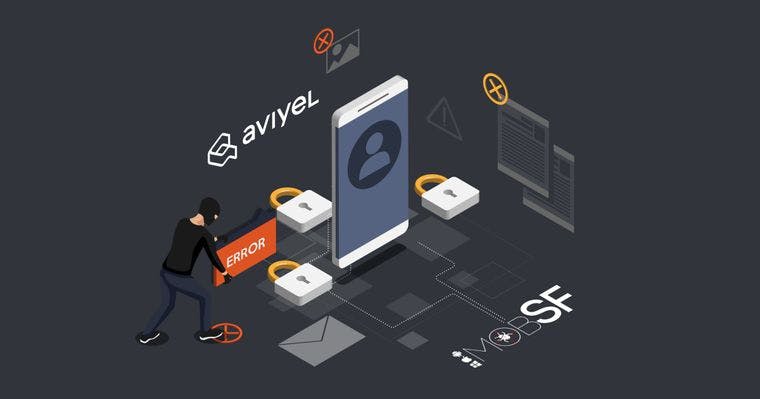To view the full article click here
 photo credits: Aviyel
photo credits: Aviyel
According to research, the mobile application industry is one of the fastest-growing globally; the Google Play Store adds approximately 1,300 new apps each day, while the Apple App Store adds about 1,000 each day.
As companies and organizations try to create great, innovative and functional mobile applications, they also have to improve their security.
This article talks about MobSF, an open-source mobile application security tool, and how it helps governments, startups and established companies build secure and efficient mobile applications.
What is Mobile Security and why is it Crucial
 photo credits: aviyel
photo credits: aviyel
Mobile application security describes those security measures in mobile applications to prevent attacks from malicious hackers and steal private, personal and financial data. It includes the security inspection & examination that happen during application development and design. Still, it also involves techniques and methods used to protect mobile apps after they get deployed and distributed.
Mobile application security is the process of creating, including, testing and implementing security features within applications to prevent security vulnerabilities against threats such as unauthorized entry and illegal modification of source code.
In simple words, mobile application security is simply protecting Mobile Applications (applications like Instagram, Whatsapp, Facebook, etc.) from external threats like Malware and other digital frauds that risk the personal and financial data of mobile application users.
Why is Mobile Application Security Important to Companies and Organizations
Protection of User Information
When the security of your mobile application is weak, hackers can use a trojan and gain access to the personal details put into the app by the user’s details like date of birth, passwords, birth certificates etc.
The Anubis banking Trojan is a good example of a case in this category. The trojan enters the user’s device when the user downloads malware-infected [apps, some of which are even hosted on the official app stores of Android. Once the trojan gets access to the user’s phone through permissions granted the mobile application, it is then able to send and receive SMSs, read contact lists, request permission to access device location, allow push notifications, and determine the IP address of the mobile connection along with access to the user’s personal and private files.
Even an app like WhatsApp is a victim of a lack of solid and functional mobile app security. Sometime in the year 2019, WhatsApp acknowledged that its app was vulnerable to spyware from an Israeli firm called the Niv Shaleva and Omri(NSO) group that could infect a mobile device simply by calling a WhatsApp user on an unknown number it wouldn’t even matter if the user picked the call or not. Once infected, the spyware can send almost all the user’s data, including the user’s contact lists, GPS information, media files, etc., from the user’s device to the hacker’s server where the hacker can access it.
Safeguarding Users Financial Information
Mobile applications that process the payment on their platforms like Shopify need to pay extra care to mobile application security as they handle the users’ financial information.
Hackers who can get past the mobile app security of the apps listed above can get financial data of users data like; credit card numbers, debit card numbers etc. and this could be used to make illegal transactions using user’s accounts, particularly in cases where an OTP (one time password) is not required.
Kaspersky antivirus researchers have discovered a new version of the famous banking Trojan Ginp, which can steal users’ credentials and credit card information from the user’s mobile device. It gains access to users’ mobile devices through their SMS apps; the trojan’s code manipulated mobile applications of 24 Spanish banks.
Protection of App Rights
Mobile application security helps protect the right of the mobile application company to distribute and earn revenue from their mobile app.
When a mobile application becomes hugely successful, hackers gain the codebase (source code) of the application and use it to create their clones illegally or steal the company’s intellectual property.
The more successful a mobile application app is the more clones that will be built and made available on the mobile app stores. For example, when Fortnite and PUBG Mobile became popular, they were not available on google’s play store. Still, many clones soon became known because of how popular the game was and the massive demand for it. It got so bad that at one point, google play had to warn its users that Fortnite wasn’t available for download on the play store to prevent the cloning from taking place.
Safeguarding Against Revenue Loss
Many applications offer premium subscriptions to their user’s apps like Spotify, Netflix , Hulu , Tinder etc. And this serves as a way for the app creators to earn income and monetize their apps.
But without excellent and functional mobile application security to enforce this, it becomes possible to make use of those premium features without payment.
A few years ago, the mobile security company Bluebox revealed the techniques used by malicious hackers to access the premium features of popular apps like Hulu and Tinder; how they exploited security holes in them and caused losses to their owners. At the time of the infiltration, Hulu’s monthly subscriptions were being offered at $7.99 a month for its Over The Top (OTT) streaming service.
Increase in Users Confidence
At the centre of every business lies the confidence of customers in the businesses brand; if your mobile application is lacking security-wise and this becomes public knowledge for hackers apart from the inevitable loss of crucial user data, you could also face a lot of lawsuits from angered users which would, in turn, reduce user trust in your platform and as a result of this reduce revenue input.
If you have good application security, then your users will feel comfortable while using your append; this will, in turn, increase revenue streams for you.
MobSF, as we stated earlier, is a mobile security tool that makes it very easy to build excellent and functional security for mobile applications.
To Begin...
What is MobSF
 photo credits: aviyel
Mobile Security Framework AKA MobSF is an automated, open-source, all-in-one mobile application (Android/iOS/Windows) pen-testing framework capable of performing static, dynamic and malware analysis.
photo credits: aviyel
Mobile Security Framework AKA MobSF is an automated, open-source, all-in-one mobile application (Android/iOS/Windows) pen-testing framework capable of performing static, dynamic and malware analysis.
In simple words, MobSF is an automated framework that automates and hereby makes it easy to build functional and secure security for mobile applications.
It is used to perform analysis on Windows, Android and IOS mobile applications for the presence of malicious software, which could in any way make the mobile application susceptible to outside attack.
This article was originally given to me as a contract and I am legally bound not to provide any more content if you want to read more visit the official article by clicking here.
